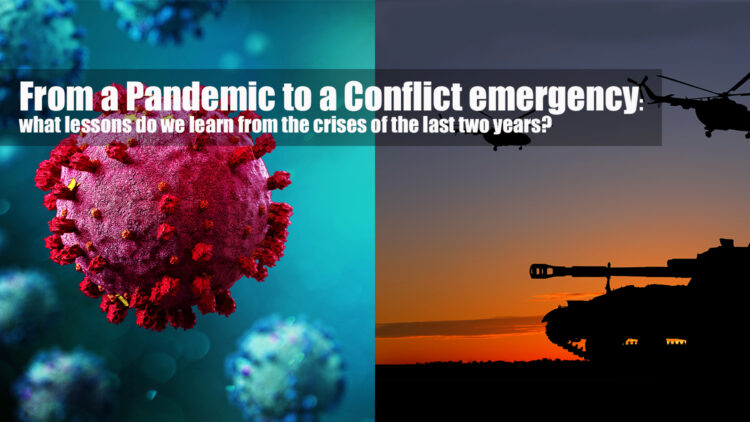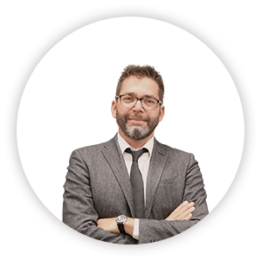From a Pandemic to a Conflict emergency: what lessons do we learn from the crises of the last two years?

Just like everybody else, I am extremely sad and confused in front of the development of these last weeks’ events.
I have good friends both in Russia and Ukraine, and I am hearing from them they are just as confused and scared about this new crisis.
My thoughts and prayers are for all of them.
As an entrepreneur, I ask myself: how is it possible that we are just about to exit one emergency, the Coronavirus pandemic, and we are jumping straight into a new one, possibly with even more uncertainties? And how do we deal with it?
Follow me on this: it is NOT going to be the typical technical article, and for some of you it is not going to sound “politically correct”.
BANI versus VUCA
Analysts have said that for the last decade we have lived in a VUCA economy: the acronym stood for “Volatile”, “Uncertain”, “Complex” and “Ambiguous”.
Now it seems we are moving towards a BANI economy: what was “Volatile” has become “Brittle” or Uncertain.
What was “Uncertain” is now generating “Anxiety”.
“Complex” dynamics have become “Non-Linear”.
And what was “Ambiguous” now has become really “Incomprehensible”.
If you love acronyms, this article dates back July 2020: https://stephangrabmeier.de/bani-versus-vuca/
This article was written just after the start of the Pandemic, and the trend it illustrates remains extremely actual even today, especially when we add the last challenges the manufacturing world has faced in the last months: the stress on the supply chain, the increase of the transport costs, the increase in prices for raw materials and commodities, inflation, the shortage of industrial components such as motors, electrical and electronic parts and so forth.
So, we can ask ourselves: as entrepreneurs, is there any lesson we can take from these last two years’ crises?
Well, I believe there is no “recipe” to face such a challenging situation, but we can definitely draw some conclusions.
First, we have a constant: Change
Just as in the beginning of the pandemic, we understand that there is no “status quo”.
The very moment we may think we can settle down and have created procedures, reshaped our market and expectations for one scenario, we suddenly have to change our plans, strategies, and priorities.
The Philosopher Heraclitus used to say that “Nothing endures but change“.
It was true over two thousand years ago, and definitely still is.
I and Anthony Smith have dedicated a large part of my first book to insist that as managers, leaders and entrepreneurs, we know that there are situations that are outside of our control.
More often than not, fighting change does not work.
Embracing change does.
Second consideration: what is the REAL Wealth for a country, or for a company?
Right before the start of the conflict, we saw precise indicators in the market.
Components that used to be available within 3-4 days or weeks, need now up to 8-9 months for the delivery.
The cost of transportation and the time for receiving goods from overseas has more than tripled.
Italy is deeply dependent on gas for its energy supply, and the increase in the cost of energy is affecting now our industries and families.
The cost of raw materials is skyrocketing, and the inflation is hitting families too, as it is in all of Europe.
Well, through a massive quantitative easing, in the past years the EU central bank has introduced massive financial resources, that are made available now to the EU governments and industries.
We can ask now ourselves: are these “resources” real?
I believe the happenings of the last two years have shown the mere reality, of what are the REAL assets for a country (and for a company as well): the most evident are raw materials, energy resources, agriculture and farming, technology and know-how.
We thought we can buy anything from abroad?
Here is my opinion: if we keep buying from far away countries technology, micro-processor, gas, energy we will soon be dependent on these countries’ decisions.
At the end, they will own the resources AND the know-how.
I had written an important article on the phenomenon of Reshoring: many companies, especially in Europe and North America, are bringing back home their productions from the far east and east Europe.
Originally, they chose to move the productions out to these far away countries because of the lower labor costs.
Today, with automation they have the possibility to efficiently move back the production to their home countries and therefore:
- They have solved the problem of the transport costs
- Their productions are a lot more responsive to their market requests
- They have control over quality, but most important…
- They have stopped “teaching” the tools of the trade to other potential competitors!
If you wish to read the full article: you can click here: https://www.dallan.com/en/news/reshoring-post-covid-three-out-of-four-companies-move-production-back-into-the-country/
In Italy we know it well: we are not rich in natural resources, and there are raw materials we need to buy from abroad.
I spoke yesterday with a Swiss customer of mine, and they are exactly in the same position.
And when we do have the natural resources, they are very hard to exploit.
For example, we do have a lot of resistance to drilling for using our natural gas, or to the use of nuclear energy for the production of electricity.
And therefore, we buy electricity from French nuclear power plants.
What made Italy an industrial power is its ability to transform these materials efficiently in products.
It is its ingenuity, its know-how and the technologies we have developed.
We had to rely on the creativity of our artists and engineers to climb to its position in the world economy.
The real wealth of our Nation, and of our industries, is the know-how.
Think of this scenario: what if the 100% of the production of micro-processors was detained by one country only.
Wouldn’t we all be at the mercy of this sole producer?
For me, it is crystal clear.
We need to learn to bring back productions to our countries: goods, technology, steel, services.
These will be the assets that will over time guarantee the wealth of our countries, and the security and the continuity of our businesses as well.
Hundreds of our clients have already moved in this direction: of course, in order to bring home the productions, they needed to be able to do it efficiently.
They have already understood and applied the basics for an efficient production: Productivity, Automation, Flexibility and Sustainability, therefore producing using less raw material, energy and labor.
20 of them have accepted to share their secrets with me and have contributed to the writing of my first book, “The Revolution of Efficiency”.
In this very particular time, I have decided to make it available again on Kindle, and it will be completely free for you to download for the next five days, CLICK HERE
Wish you all the best for your life and businesses.
Take care,

Andrea Dallan
CEO – Dallan Spa
